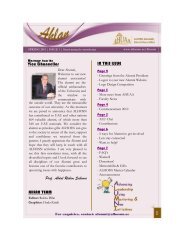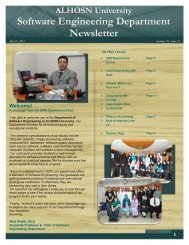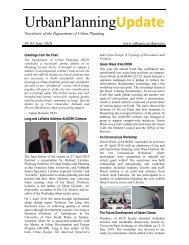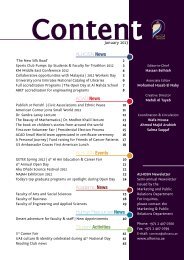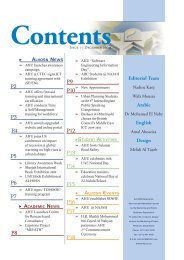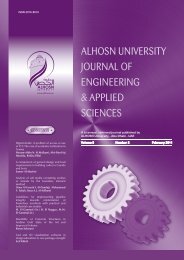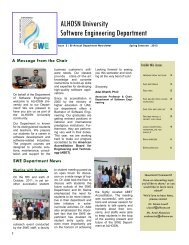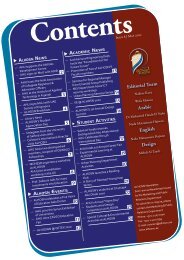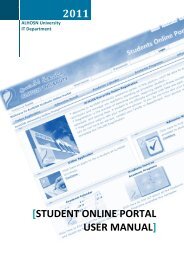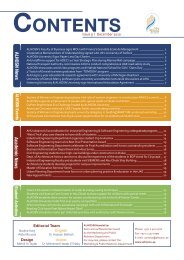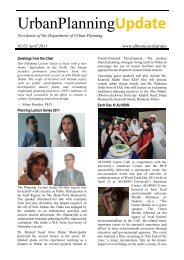ALHOSN University Catalogue Global Knowledge with Local Vision ...
ALHOSN University Catalogue Global Knowledge with Local Vision ...
ALHOSN University Catalogue Global Knowledge with Local Vision ...
Create successful ePaper yourself
Turn your PDF publications into a flip-book with our unique Google optimized e-Paper software.
also introduce students to ideas on how to create communities of learners outside the school setting, exploring<br />
strategies to involve the family and community in the learning process of students.<br />
EDU 553 Education of Youth and Adolescents<br />
This course will examine the major theories of child and adolescent development, including intellectual,<br />
biological, and psychological development. Models of learning based on these theories will be explored along<br />
<strong>with</strong> the major theorists who have influenced educational thinking. Included in this course is an overview of first<br />
and second language acquisition and how it influences learning. Successful completion of the course will enable<br />
students to move these theories into effective classroom practice.<br />
EDU 554 Assessment Practices Serving All Learners<br />
This course is designed to provide students <strong>with</strong> an understanding of the multiple methods of assessment<br />
available; formative and summative as well as traditional and performance based. Students will examine the role of<br />
preconceptions and background knowledge a student brings to their classroom and how to follow student<br />
progress <strong>with</strong> a variety of assessment practices. In addition, strategies for data analysis will help candidates be<br />
prepared to assess individual students as well as whole class progress. Particular emphasis in the course will be<br />
placed on aligning assessment strategies <strong>with</strong> curriculum goals while meeting the needs of diverse learners.<br />
EDU 555 <strong>Knowledge</strong> Construction and Subject Matter Competence<br />
This course is designed to provide reflection on the theory of learning and instruction, create an understanding of<br />
theoretical frameworks, and provide an opportunity to connect philosophy to teaching practice. Topics will<br />
include the various ways of knowing, the impact of subject matter competence on knowledge construction, and<br />
ideas of life-long learning and reflective practice.<br />
EDU 556 Pedagogy and Curriculum Innovations<br />
This course will examine current trends in elementary and secondary school curriculums. Students will analyze<br />
the continuum of instructional methods and recent innovations in curriculum implementation to better understand<br />
their own practice. Students will also explore processes for designing and developing curriculum <strong>with</strong>in their<br />
own schools.<br />
EDU 557 Teaching as Inquiry<br />
This course will examine the recent trend of using student work to assess learning. The close and<br />
collaborative examination of student work has become a practice in many innovative schools. Student work has<br />
become not only a source of insight into student learning but also a method to assess the effectiveness of<br />
instruction, curriculum, and resources of the learning environment. The course will investigate the ways in which<br />
student products can be studied as evidence of teaching and learning. Candidates will explore how methods of<br />
inquiry can reveal the subtle processes of learning and the interactions among learners’ minds, subject matter,<br />
materials, and the learning environment.<br />
EDU 558a Leading Change in Schools<br />
This course introduces students to school leadership practice, emphasizes adult learning theory, reflective practice,<br />
content-based decision making, the formation of learning communities, and leadership ethics. Candidates will<br />
begin to organize their professional portfolios.<br />
EDU 558b Educational Reform<br />
This course examines the many forms of formal and informal teacher leadership and explores the role that teachers<br />
must play in the reform of public schools. It analyzes the challenges to teacher leadership created by the structure<br />
of schools and the culture of teaching and assesses teacher leadership in relation to the developmental needs of a<br />
rapidly changing society. A strong focus on innovative curriculum and instruction as a means to improve the<br />
teaching – learning process will form the basis of the course.<br />
EDU 558c Literacy and Language Development<br />
This course focuses on the examination of the theory, research and practices that affect reading and writing as<br />
well as Second Language acquisition. Based on current theory, practices, and research- based skills and<br />
knowledge about instructional strategies, the following elements of a balanced literacy program are covered in<br />
this course:<br />
Developmental instructional strategies aligned <strong>with</strong> ongoing formal and informal assessments to meet<br />
the needs of all students.<br />
The development of fluent reading in students at all grade levels.<br />
Reading comprehension strategies (e.g. text analysis, thinking and study strategies, and independent<br />
reading of high quality books), including foundational skills in academic language, background<br />
knowledge, concept formation, and vocabulary development.<br />
201



